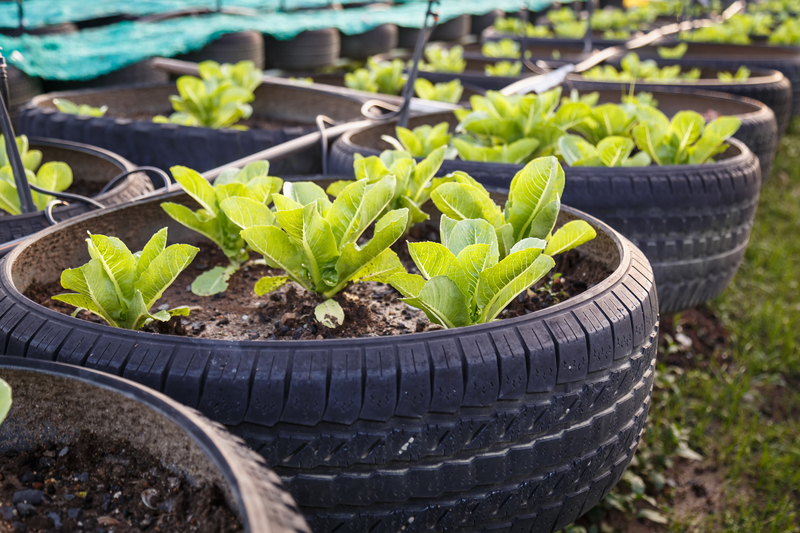Innovative Methods for Plant Pot Disposal
Posted on 02/06/2025
Innovative Methods for Plant Pot Disposal: A Comprehensive Guide
Are you wondering how to dispose of old plant pots in a way that's both efficient and environmentally conscious? Whether you're a home gardener, plant enthusiast, or landscaping professional, the surge in plant pot waste is a reality we all face. With the rising popularity of container gardening, the challenge of sustainable plant pot disposal has never been more pertinent.
This guide delves into innovative methods for plant pot disposal--exploring creative, planet-friendly options beyond simply tossing them in the bin. Learn how to manage, recycle, and repurpose your unwanted pots while reducing your environmental footprint!

Why Is Responsible Plant Pot Disposal Important?
- Plastic plant pots contribute to landfill waste. Standard black plastic pots are often not accepted in recycling programs due to their coloring or material composition.
- Ceramic, clay, and terracotta pots can break down into hazardous shards. These can injure wildlife or cause harm if not disposed of carefully.
- Eco-friendly plant pot disposal reduces pollution, conserves resources, and encourages a circular economy.
Proper plant pot disposal supports sustainability efforts and helps reduce the negative impact of horticultural waste. By embracing innovative alternatives, gardeners can foster greener practices and inspire others to do the same.
Primary Types of Plant Pots and Their Environmental Impact
Plastic Plant Pots
Plastic pots are the most common and affordable option for both commercial growers and gardeners. However, traditional plastics can take hundreds of years to decompose and often end up in landfills or polluting waterways.
Ceramic, Clay, and Terracotta Pots
These pots are valued for their breathability and aesthetics. Unfortunately, damaged ceramic and terracotta pots often cannot be recycled through municipal recycling programs due to their glazing and mineral content.
Biodegradable and Compostable Pots
Modern innovation has led to plant pots made from coir, peat, bamboo fiber, or rice husks. These break down naturally in the environment, making disposal straightforward and sustainable.
Innovative Methods for Plant Pot Disposal
1. Repurposing and Upcycling Your Plant Pots
Upcycling transforms old plant pots into valuable household or garden assets. Here are some imaginative ways to give your unwanted pots a new lease on life:
- Garden Organization: Use pots as organizers for tools, garden tags, or seed packets.
- Craft Projects: Paint and decorate pots for creative display, kids' activities, or holiday decorations.
- Bird Feeders and Houses: Transform larger pots into feeders or shelters for wildlife by adding natural materials.
- Storage Solutions: Stack or hang pots in sheds to store twine, gloves, bulbs, or fertilizers.
- Tabletop Planters: Small or broken pots can serve as rustic tealight holders, succulent displays, or mini herb gardens.
Upcycling is an easy, zero-waste approach that extends the functional life of your pots and sparks creativity at home or in classrooms.
2. Community Pot Swaps and Plant Nurseries
Organize a pot swap in your local area, gardening club, or community center. Garden centers appreciated receiving gently used plastic pots, especially standard sizes such as 1, 2, or 3 gallons.
- Drop-off bins: Many nurseries and big box stores have returned programs for plastic cell packs, trays, and pots.
- Local growers: Professional growers can sanitize and reuse plastic pots, reducing their purchase of new materials.
This collective approach encourages a culture of reuse and reduces demand for new plastics in horticulture.
3. Recycling Plant Pots: Guidelines and Eco-Programs
While plant pot recycling can be tricky, there are ways to do it properly:
- Check for Recycling Codes: Look for recycling symbols on your pots. Most recycling programs accept code #5 (polypropylene), but check local guidelines.
- Clean Thoroughly: Remove all soil, labels, and plant material before recycling to ensure acceptance.
- Participate in Specialized Programs: Some companies and gardening associations run periodic collection drives for horticultural plastics and pots. Garden centers such as Lowe's or Home Depot frequently have drop-off bins.
Innovative advanced recycling facilities are now using sorting machines that can correctly identify and process black plastic pots. Search online for eco-facilities or specialized plastic recyclers in your region.
4. Composting Biodegradable and Peat Pots
With the surge of biodegradable plant pots, composting is the eco-friendliest option.
- Plant Directly: Many biodegradable pots are designed to break down in soil when planted directly, feeding organic matter back into the earth.
- Add to Compost Heap: Break up pots made from coir, sheep's wool, peat, or compressed paper, and mix them into your compost pile. *Always check that no synthetic glues or coatings are present!*
Composting plant pots is a zero-waste solution supporting circular gardening practices and soil health.
5. Terracotta and Ceramic Pots: Responsible Disposal
Broken or unneeded terracotta pots don't have to end up in the trash.
- Drainage Aid: Break pots into small shards (often called "crocks") and use them at the bottom of plant containers to improve drainage.
- Garden Paths and Mulch: Crushed pottery creates attractive and weed-reducing paths, mosaics, or even garden markers.
- Art Projects: Shards can be incorporated into mosaics, crafts, or as decorative touches in landscape design.
For unglazed pots, landfill is a last resort, but repurposing is always preferable!
Other Innovative Disposal Techniques and Future Solutions
6. Industrial Plant Pot Collection Schemes
Some municipalities and environmental groups are piloting collection and recycling schemes specifically for horticultural plastics. These often include:
- Drop-off points at recycling centers: Designed for community collections, these facilities sort and process all types of plant pots.
- Retailer partnerships: Programs with local or national retailers ensure clean pots are sanitized and returned to the supply chain.
- Returnable deposit pots: Innovative businesses are designing pots that can be returned for cleaning, refill, and reuse--similar to a bottle deposit system.
As demand grows, expect even more innovative plant pot recycling initiatives in the years ahead!
7. Shopping for Sustainable Plant Pots
Choose eco-friendly plant pots made from recycled plastics, compostable materials, or renewable fibers. Many brands are replacing petroleum-based plastics with alternatives such as bioplastics or recycled ocean plastics.
- Brands with Take-Back Schemes: Some pot manufacturers offer to collect used pots for recycling or re-manufacturing.
- Reduced Packaging: Purchasing bare-root plants or using grow-bags reduces container waste entirely.
Your purchasing choices help create more demand for circular, sustainable products and disposal solutions.
8. Donating Plant Pots
Many nonprofit organizations, community gardens, schools, and urban farms are in need of pots for their planting projects.
- Contact local schools: Educators often use pots for horticulture classes or science projects.
- Community groups: Urban agriculture projects, food banks, or public parks usually welcome donations.
Donation not only reduces waste but also fosters community well-being and green initiatives.
9. Art and Architecture: Large-Scale Repurposing
Innovative artists and landscape architects are using discarded plant pots to build installations, walls, or vertical gardens. This creative reuse creates awareness and adds aesthetic value to public spaces.

Best Practices for Plant Pot Reuse and Disposal
- Always sterilize pots before reuse. Wash thoroughly and, if plastic, soak in a 10% bleach solution to remove pests and pathogens.
- Remove all soil and plant debris before recycling or donating to ensure pots are accepted.
- Check local regulations for recycling if unsure. Many municipalities now publish updated guides related to plant pot disposal.
- Encourage sustainable habits in gardening clubs, schools, and businesses to reduce horticultural waste from the source.
Remember, the more creative and proactive you are, the fewer plant pots end up as landfill--and the more sustainable our gardens will become!
Conclusion: Pioneering New Paths in Plant Pot Disposal
The innovative disposal of plant pots is essential for a sustainable gardening future. Whether you repurpose, recycle, donate, or compost, your effort has a direct, positive impact on the planet.
With new materials, community swaps, recycling technology, and creative projects, there are now eco-friendly plant pot disposal solutions for everyone. Start with small changes and share your knowledge: together, we can cultivate a greener, less wasteful world--one pot at a time!
Latest Posts
Mini Skips Uncovered: The Basics
Steering Clear of Harmful Plastics: What You Need to Know
Maximize Your Recycling at Home with Simple Suggestions
Breathe New Life into Style: Smart Clothes Recycling Solutions







